by Chris Tharp
Korea, Sparkling!
Some years back this slogan was trotted out for the world to see by the nation’s tourist board, to the snickers of the more jaundiced expats on the peninsula. Over cold mugs of Cass and Hite we shook our heads, rolled our eyes and once again thought: Must they try so hard? CNN International was bombarded with commercials featuring lithe, leggy girl groups strutting through the streets of Seoul, while b-boys twisted, popped and busted moves along the banks of the mighty Han River; Pop star Rain flashed his six-pack abs while lauding the virtues of bibimbap in stilted, awkward English; lasers shot from atop gleaming skyscrapers and fireworks showered over packs of smiling youths who wildly danced, leapt, and celebrated the fact that not only had the Korea stepped into the future, but it was now its new standard-bearer.
And you know what? Maybe they weren’t trying so hard after all. Perhaps they were right. After all, South Korea really is a land of uber-modern marvels. Cutting edge technology permeates the society in a way that I have yet to see matched in any of my other travels–and this includes visits home to America, that great land of ideas and innovation that birthed such luminaries such as Apple, Intel and Google. Smart phones are omnipresent, and as the most wired country on Earth, the internet is rarely more than a spit away. Dirt cheap PC rooms are almost always within eyeshot, and wifi is available in most public places, including the country’s trains and subways. That’s right, you can sap free, high-speed internet out of the air while traveling hundreds of feet underground in an aluminum tube. Crazy stuff. Take that, Japan.
When I first arrived in Korea I was astounded by the modernity–by the buses, reader boards, hi-speed trains, and multicolored neon signs that hypnotized me on my nightly strolls. These people are really riding the crest, I thought. Korea is a twenty-four hour gig, with decked out restaurants, stores, cafes, bars and clubs whose doors are open until the early morning. Some never close at all. The sidewalks pulse with throngs of well-scrubbed young folks sporting straight-off-the-rack clothes, and the streets are full of shiny, new, immaculate cars: Most Koreans don’t do second hand. In these ways and more it made good ol’ Seattle—home to modern giants Microsoft and Boeing—seem positively provincial.
But despite this well-constructed veneer of modernity, you don’t have to look too far to see the older, shabbier, decidedly less-glamorous Korea. There are cracks in Korea’s glistening new pavement, with the old country oozing right back up to the surface. Despite all of the attempts at chic modernity, Korea still keeps one toe firmly planted in the Third World. Dog soup restaurants, while technically illegal, can be found serving up steaming bowls of Fido on sketchy sides streets. The rivers and streams of the big cities turn into superhighways of human shit after a good rainstorm, and the reek of raw sewage often wafts from storm drains, made especially rank during the summer months, when the punishing heat percolates the crappy brew. Impoverished senior citizens scrounge the streets and apartment blocks for scraps of cardboard and sell odd things from even odder locations. The other day I was emerging from a multi-million dollar subway station with LED monitors, glass elevators and the obligatory wireless internet, when there, just ten feet from the exit, sat a ninety year-old woman selling three dead octopuses and a pile of tree bark. New Korea, meet the old.
Where the old school really rears its uncouth head is in some of the local folks’ behavior and practices, both public and otherwise. People ride their motorcycles on the sidewalk and aggressively honk at pedestrians in the way. Traffic laws, while enforced more than before, are still pretty much optional, at least according to the drivers in my home city of Busan. People get drunk as hell, bellow and stagger, puke on the sidewalk and pass out in the street with disturbing regularity. When confronted by the timid police, it’s often the cops themselves who are abused. Men over the age of fifty hock phlegm, spit with impunity and piss pretty much anywhere they please, especially after sundown. Forming lines has still yet to totally catch on, and hardscrabble old women jostle, push, and throw elbows in the streets, subways and markets, with nary an “excuse me” nor a glance of regret.
Yes, rest assured: Rough old Korea is still alive and well, and I’m not sure if any amount of eyelid-enhancement surgeries, Galaxy smart phones, or Angel-in-Us coffee shops will change that. Some habits are just too hard to break.
It was Saturday afternoon and I stood there in the station with two buddies from Busan: Scraggs, who hails from Essex, England, and Johnny “The Greek,” who actually grew up in Ontario.
“We should have gotten our tickets beforehand,” lamented Scraggs in his southern English whine. “They always sell out early on weekends.”
“That’s all right,” shrugged The Greek. “Korean busses are pretty plush.”
“But there’s no bogs on the buses,” Scraggs further moaned. “What am I to do if I have to go for a slash?”
“Maybe lay off the beer this time,” I chimed. “It’s a three-hour ride. We wouldn’t want you to piss your pants. Again.”
“I didn’t piss my pants. It was just a bit of dribble.”
“Dribble my ass.” The Greek smirked. “It looked like a fuckin’ map of Antarctica.”
Scraggs had indeed wet himself during the bus ride from Busan to Gumi the night before. The beer downed at the hof in the bus station, plus the several cans supped on board pushed his bladder to the breaking point. As there were indeed no ‘bogs’ on the bus, he was forced to improvise. He managed to fill two of the big cans back up with a warmer vision of their previous contents, without being noticed by any of the mostly snoozing passengers. But the timing of the withdrawal had been misjudged, resulting in massive leakage, which presented itself as a clearly visible stain of shame on the crotch of his jeans. There was no hiding it, and The Greek and I howled as he descended the steps of the bus into the frigid December night.
We were in Gumi, a windswept town that sits at the base an imposing sheer ridge, about 30 minutes north of the city of Daegu. We were on the road, bringing The Ha-Ha Hole–our standup comedy show–to mostly foreign folks living in Korea’s hinterlands. That’s right, on weekends we sometimes traveled around the country telling kimchee and dick jokes to smoky bars full of fellow drunken expats, where we were paid in cheap beer and, on the good nights, a free hotel room. This was a hobby of sorts–a good way to break up the day-to-day monotony of teaching English conversation to half-dead university freshmen, though it could be said that the ESL racket and stand up comedy are almost the same thing: You gotta entertain the troops, and you know when you’re bombing because it happens a lot.
Gumi, Crumbling!
The night before, we gigged at a watering hole owned by a young English woman and her bleary-eyed, teetering South African husband. Like most expat bar proprietors I’ve met, he freely ignored the warnings and got very high on his own supply. He was a good guy though, despite looking like he had probably killed a man at one point. It was wintertime and freezing, the kind of cold that’s makes your skin hurt. The place was poorly heated and we could see the steam of our breath as we each stood in front of a half-lit Christmas tree and attempted, through chattering teeth, to deliver jokes into the mike. The fifty-person crowd stuffed into the joint was looking to have a good time and was generous in both its drinking and laughter. They were mainly from South Africa as well, evident from the preponderance of bright, blond hair and violent booing when, during an improvised bit, I made the mistake of mentioning their arch-nemeses, the New Zealand All Blacks, recent winners of the Rugby World Cup.
It was a raucous night and we had now mostly slept our hangovers off, so after striking out at the train station, the three of us poured into a taxi and were ferried across town to a forlorn bus depot, where we procured tickets to get us out of Dodge. But the bus didn’t leave for three more hours, so we killed the afternoon with a much-needed soak and sauna, where Scraggs and I marveled at the maelstrom of hair springing forth from The Greek’s back. According to The Greek—whose parents come from the old country—his mother is quite fair, but his father is a real hairball, hailing “from a part of Greece where the Turks were a bit more aggressive with the raping.” The public bath hides nothing, and it was clear that he indeed took after the old man in spades. So after bathing we returned to the bus station relaxed and refreshed and got on board, ready for a safe and happy journey to the city of Suwon, a satellite of Seoul and home to our next gig.
Korean long-distance buses are generally as comfortable as it gets, with plenty of leg room and seats that recline to nearly forty five degrees. They’ve got plentiful heat in the winter and air-con in the summer. The passengers are quiet–usually sleeping the hours away or taking in movies on their smart phones or tablets–and the busses almost always run ahead of schedule. This is due to the diligence of the drivers, who nearly always pilot the things like kamikazes heading straight to the deck of an American carrier. It’s a pure heavy metal roots medley when a Korean driver burns down the road and this driver was no exception: He was a Highway Star Hell Bent on driving Balls to the Wall.
Yeah, the bus was often approaching speeds of Mach 1 on a highway jammed with weekend traffic, but that was no bother: we were all used to it. Sure, he regularly hit the brakes with desperate, jarring stomps. This jostled the bags stashed above and sent our foreheads slamming into the seats in front of us, but not an eyebrow was raised. No one whined, spoke up, yelled or exhibited the slightest outward sign of alarm. We were on a bus in Korea and everything was how it was supposed to be.
My first sign that this time may be different came about an hour and a half into the three-hour journey. I was listening to a mix of PJ Harvey songs on The Greek’s i-pod that he had most generously lent me, since my phone’s battery was long dead. It had been years since I had really rocked to Polly Jean, and I sat immersed, rediscovering all of those great old cuts from Rid of Me and Dry, as well as savoring her newer, more down-tempo stuff. At one point I took a break and looked over to The Greek, whose whole being was focused onto the tiny screen in front of his face. His brow was furrowed and his dark eyes made beams.
“Hey Greek, this is awesome. I’m listening to your PJ Harvey file right now. Do you know how long it’s—-”
“Not now dude. I’m in the middle of this.”
“What is that?”
“What does it look like? A fuckin’ game.”
“I know that. What kind of game?”
“It’s a driving game. Take a look.”
He tilted the screen my way and went about clicking and thumbing the controls.
“I’m driving the bus.”
“Okay.”
He was driving a large passenger bus on an elevated highway in a generic city. There appeared to be moderate traffic. “Check this out,” he nodded, jerking the bus into a side lane and smashing into several cars, which flipped and spun out of control.
“Yes!” He then plowed through the guardrail, causing the bus to plummet far down to the lower level, which resulted in even more mayhem and destruction–crushing cars, motorcycles, vans, and trucks–until it finally came to a full stop. This just turned the bus into giant obstacle that other vehicles hurtling down the road, in turn, smashed into. It was a rolling snowball of complete havoc and spectacular chaos—all shattered glass, bent metal, fire and thick smoke–depicted with realistic, violent, state-of-the-art graphics. Who knows? The programmers were probably Korean.
He turned to me with a possessed grin. “The point of the game is to destroy as much as you possibly can.”
“Cool,” I said, putting the ear buds back in. “I used to play a similar game at my friend’s place.”
He continued the game and I went back to scrolling through his massive digital library, never once stopping to chew on the fact that The Greek was crashing a virtual bus while riding on a real one. Wasn’t this just a bit odd? A brazen temptation of fate? Evidently not, because I gave it no pause: This is just what people do on busses in Korea.
It happened during the intro to a song by Strawberry Switchblade—an obscure gothic synth-pop duo from the 1980’s that I was amazed he had on file. The driver hit the brakes hard. I felt my whole body sucked forward by gravity. I braced myself with my right arm, and then…
BOOM!!!
This was felt more than heard.
“Fucking ‘ell!” shouted out Scraggs
The brakes locked and the tires ground against the pavement, screeching for what seemed like minutes, until the bus eventually came to a halt.
“Holy shit.” The Greek turned off his game and sheepishly stashed it.
I ripped out the buds and exhaled. “We just hit something for real.”
All the passengers stayed in their seats, momentarily stunned.
“Ayaya! Aya! Aya!” A fat guy sitting in the back row theatrically gripped his neck in mock pain. I could see won signs flashing in his squinting eyes.
We all sat for what must have been thirty seconds, trying to figure out just what was going on. I decided to check it out for myself, so I got up and walked to the front of the bus, where I was joined by two other Korean passengers.
The bus’s lights illuminated the scene in front of us: A silver, two-door car lay largely crushed. The bus was also significantly damaged. The rear of the car looked like a smashed beer can; anyone sitting there would be liquefied. A man sat in the driver’s seat, partially enveloped by a white airbag. The bus driver was outside, shouting to him.
The three of us in the front were joined by a few other passengers, who like me, now understood the fact that not only had the bus hit the car, but that it had pushed it 100 meters down the road—devastating it in the process–until it came to rest next to the guardrail. They shook their heads, sucked air through their teeth, and exclaimed:
“Oh my!”
“Is he okay?”
“That looks bad.”
“Is anyone else in the car?”
After a minute or two the car’s driver emerged from his seat, shaken, shocked, but apparently unharmed. It was the back of the vehicle that received the brunt of the damage, and you can imagine our collective relief when the bus driver poked his head in the bus’s door and told us that the dazed man had been the only occupant.
Korea’s efficient, modern side was the first to show its face that night, as emergency services were on the scene within minutes of the collision. The police arrived first and directed traffic around the scene. The paramedics were next, who strapped the car’s driver onto a gurney and whisked him away. Bringing up the rear was the wrecking crew, who dragged the totaled car off the road with amazing focus and speed. We marveled at their professionalism: They really had their shit together. I got the feeling that they had done that sort of thing a few times before.
The bus was damaged but driveable, and the driver managed to limp it down the highway and off an exit near the city of Cheonan, following the wrecking truck. He then pulled the bus to an area near the off ramp and told us all to wait for a few minutes; that a new bus was on the way. The wrecking crew deposited the smashed car next to several other dented husks. It must have been a dangerous stretch of highway. Wrecked car storage? Nothing was being left to chance, but what impressed me the most was the pace of the operation. Procedures had obviously been put in place and at this point we’d be able to make the show with time to spare. Bravo, new Korea.
But here’s where the baton gets passed.
The new bus arrived, with a fresh new driver. It seemed that the bus company was keeping up its end of the bargain and guaranteeing the rest of our journey with speed and safety. We disembarked the old bus and walked in a line past the first driver, who chain-smoked with trembling hands and stared out into the night, his eyes black pits. He looked like he needed a hot shower, a massage, and about three double pours of whisky. He was traumatized and stank of regret. I pitied him.
Once on the new bus, a policeman boarded and asked if any of us needed to go to the hospital. We all declined. He then passed around a clipboard and asked for contact information of anyone who planned to visit the hospital later. This was everyone’s chance for a payday and about half the passengers bit. The three of us passed. We were fine and we knew it.
The cop bade us adieu and now it was time to get on the road. We had a new bus and a new driver and would be able to make Suwon only an hour behind schedule. After all, the show must go on.
And then he boarded the bus. Him. He sat in the seat, clicked his buckle, and turned over the engine. He engaged the gear, pulled onto the ramp, and gave a quick honk to the new driver standing next to the old bus, who smiled and flashed a ‘thumbs up’ before we poured back onto the busy highway. That’s right: the same driver who crashed the bus would be completing the route. He would go on to nearly rear-end another car and shower us with apologies, but he would see the night out. Of course. This is what happens when buses crash in Korea. There are no debriefings, no reports to be filed, no rest for the visibly shaken operator: just the continuation of work. Suck it up, ajeosshi: you’re finishing your shift. People do not miss work in old Korea. They grind it out. They endure. How do you think the country went from being one of the poorest in Asia to now, where they walk in stride with some of the wealthiest in the world?
Hard fucking work. That’s how.
Sparkling, indeed.
(This essay appears in my latest book, The Worst Motorcycle in Laos: Rough Travels in Asia, available via Amazon and other purveyors of words.)


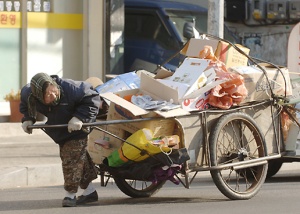
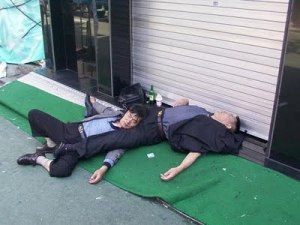
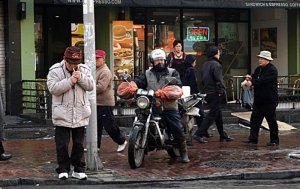
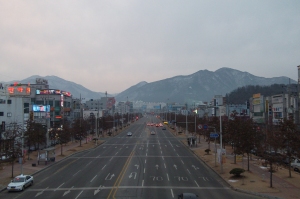
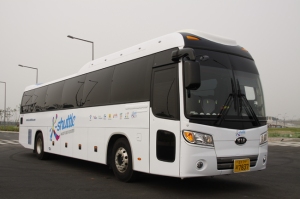
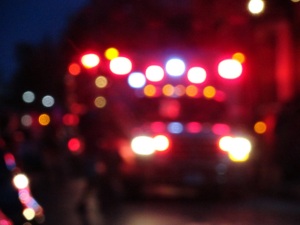
Recent comments